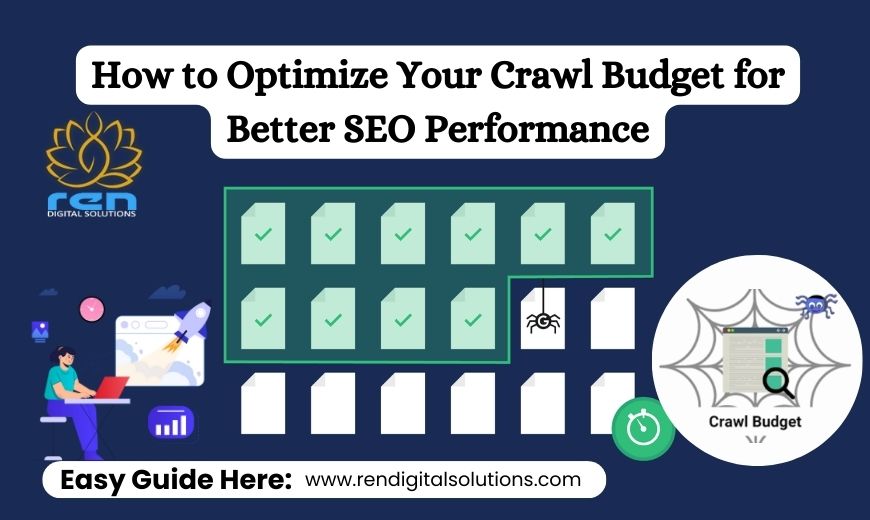
When it comes to improving your website’s SEO performance, there are numerous strategies that digital marketers use. One of the most critical aspects, yet often overlooked, is the optimization of your crawl budget. Crawl budget refers to the number of pages search engine bots crawl on your website within a specific time frame. It is crucial for search engine optimization (SEO) as it directly impacts how efficiently your site is indexed by search engines. Without proper crawl budget optimization, you may risk losing valuable ranking opportunities and causing inefficiencies in the indexing process.
In this blog, we’ll walk you through the importance of crawl budget, how to optimize it, and how it can improve your website’s SEO performance.
What is Crawl Budget and Why Does It Matter?
In the simplest terms, a crawl budget is the amount of time search engine crawlers (such as Googlebot) spend scanning and indexing the pages on your website. This budget is determined by various factors such as the overall size of your website, the health of your website’s architecture, and the quality of the content. The more efficiently you manage your crawl budget, the better your SEO performance will be, as it will ensure that the most important pages of your website are crawled and indexed quickly.
A poor crawl budget allocation can result in certain pages of your website being missed by search engines, which means those pages won’t appear in search engine results pages (SERPs). As a result, you may lose out on valuable traffic and potential business.
Factors Influencing Crawl Budget
Before diving into optimization techniques, it’s important to understand the key factors influencing your crawl budget:
- Site Size: The larger your website, the more crawl budget you’ll need. A large site with thousands of pages needs more crawling time to ensure that all important pages are indexed.
- Website Health: If your website is riddled with errors like broken links or slow load times, search engine crawlers may reduce the crawl frequency. Ensuring your site is in good health helps improve crawl budget allocation.
- Server Performance: A slow or unreliable server can impact how often search engines crawl your website. If the server is unresponsive or too slow, crawlers may decide not to revisit certain pages.
- Duplicate Content: Having duplicate content can lead to unnecessary crawling of the same page multiple times. This takes up your crawl budget and leaves little room for important pages to be crawled.
- Internal Linking: Effective internal linking ensures that search engine bots can easily discover important pages. If your internal linking is weak or your site architecture is disorganized, crawlers may not reach your most valuable pages.
How to Optimize Your Crawl Budget for Better SEO Performance
Now that you understand the basics of crawl budget, let’s delve into how you can optimize it for better SEO performance:
1. Fix Crawl Errors
One of the first steps in crawl budget optimization is identifying and fixing crawl errors. Search engines report crawl errors through their webmaster tools. These errors typically include 404 pages, broken links, or pages with server errors. Fixing these issues will ensure that search engine bots are not wasting their crawl budget on faulty or irrelevant pages.
Here’s how to fix crawl errors:
- Use Google Search Console or Bing Webmaster Tools to identify crawl errors.
- Redirect or remove pages that are no longer relevant (e.g., 404 pages).
- Repair broken links that lead to non-existent pages or resources.
- Ensure that your website’s server is stable and can handle requests from crawlers efficiently.
2. Optimize Your Site’s Structure
An organized and easily navigable site structure helps search engine bots crawl your website effectively. A flat site structure, where important pages are just a few clicks away from the homepage, is preferable. This allows search engines to easily find and index your pages.
Key considerations include:
- Use a simple, logical hierarchy for your pages.
- Avoid creating a deep folder structure where important pages are buried too deep.
- Create a comprehensive and updated XML sitemap that can guide search engines to all important pages.
3. Control Duplicate Content
Duplicate content can waste valuable crawl budget by causing search engines to crawl the same page multiple times. It can also hurt your website’s SEO by confusing search engines about which version of a page should be indexed.
To manage duplicate content:
- Implement canonical tags to indicate the preferred version of a page.
- Block duplicate content using robots.txt or noindex tags.
- Regularly check for duplicate content across your website and remove or consolidate it.
4. Use Robots.txt Strategically
A robots.txt file is used to tell search engine crawlers which pages they should or should not crawl. By using robots.txt strategically, you can prevent search engines from wasting crawl budget on irrelevant or low-value pages such as admin pages, login pages, or duplicate content.
For example:
- Block non-essential pages such as privacy policies or terms of service.
- Use robots.txt to restrict crawlers from crawling your filter or search result pages that do not add value to the user experience.
However, be cautious not to block important pages by mistake.
5. Leverage the “Noindex” Tag
The “noindex” tag tells search engines not to index a specific page, ensuring that they do not waste time crawling it. Pages with thin content or those that don’t contribute to your overall SEO strategy should be marked as noindex. This will help search engines focus on the pages that matter.
For example:
- Tag login or user dashboard pages as noindex since they don’t need to appear in search results.
- Mark certain product or category pages as noindex if they have duplicate or low-quality content.
6. Improve Site Speed
A slow-loading website is one of the biggest culprits in wasting your crawl budget. Search engine crawlers have limited time to spend on your site, and slow-loading pages may result in crawlers skipping them. The faster your website loads, the more time search engines will spend crawling it.
To improve site speed:
- Optimize images and use proper file formats.
- Minimize HTTP requests and use caching.
- Compress CSS, JavaScript, and HTML files.
- Implement a Content Delivery Network (CDN) to speed up content delivery.
7. Optimize Internal Linking
Strong internal linking ensures that search engines can easily navigate through your site and find all important pages. A robust internal linking structure not only helps crawlers but also enhances the user experience by making it easy to discover relevant content.
To optimize internal linking:
- Employ clear and relevant anchor text that reflects the content of the linked page.
- Link to important pages from your homepage or high-authority pages.
- Ensure that every important page on your website is reachable within a few clicks from the homepage.
8. Monitor Crawl Activity Regularly
Finally, regularly monitoring your crawl activity is essential to ensure that your crawl budget is being used efficiently. You can track the crawl activity through tools like Google Search Console. Look for patterns that indicate which pages are being crawled most frequently and which are being missed. This data can help you adjust your strategy accordingly.
Why Hiring the Best SEO Company in Ghaziabad Can Help
Optimizing your crawl budget requires a deep understanding of your website’s structure, SEO practices, and search engine behaviors. If you’re unsure of where to start, or if you find the technical aspects too overwhelming, consider partnering with the Best SEO Company in Ghaziabad.
REN Digital Solutions specializes in providing comprehensive SEO strategies that focus on crawl budget optimization, among other SEO aspects. Our team of experts has the experience and tools to analyze your website, pinpoint issues, and implement strategies that improve your crawl budget allocation. By hiring REN Digital Solutions, you can ensure that your site’s SEO performance reaches its full potential.
As the Best Digital Marketing Company in Ghaziabad, we offer end-to-end digital marketing services that encompass SEO, content marketing, paid campaigns, and social media strategies, all designed to boost your online presence and drive more traffic.
Conclusion
Optimizing your crawl budget is essential for better SEO performance. By ensuring that search engine crawlers focus on your most important pages, you can improve your website’s visibility and rankings. Through strategies like fixing crawl errors, optimizing site structure, controlling duplicate content, and improving site speed, you can efficiently manage your crawl budget.
Whether you’re managing SEO in-house or working with a digital marketing company, remember that crawl budget management is key to your SEO success. And if you’re looking for a reliable partner, the Best SEO Company in Ghaziabad – REN Digital Solutions – is here to help. We provide effective, tailored solutions to ensure your website gets the attention it deserves from search engines, helping you achieve better SEO performance and higher organic traffic.



